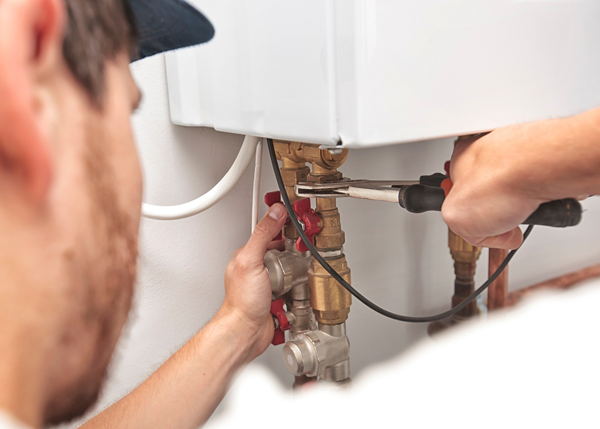The issue of heating costs is particularly relevant for homeowners right now. You may be researching the idea of saving money by opting for a combi boiler – in fact, one of the most common questions that homeowners have is, “Is a Combi Boiler better than a System Boiler?”.
In this article, we will go into the differences between the two variants and explain what advantages and disadvantages they have respectively.
Combi boiler or system boiler – what are the costs?
If a hot water system is to be installed as part of a new building or renovation, the costs play an important role in the decision-making process. In order to have a good overview here, you have to take into account both the purchase costs and the running costs.
The acquisition costs include the purchase of the system and the installation. The running costs cover the operating and maintenance costs.
Combi boilers – the costs
A modern instantaneous or combi boiler for the bathroom costs between £600 and £1200. The installation depends on the circumstances, you can find out more about the costs of a new boiler here.
Depending on the kilowatt output (KW) of the instantaneous water heater, the electricity costs for a 10-minute shower are, at the time of writing, going to average around 60p. The use of hot water at the tap also comes into play. And don’t forget the annual maintenance (boiler service).
Regular boilers – the costs
An electric boiler is available in different sizes and can therefore vary greatly in price. Small models are already available from £200, but there are also some being marketed for ten times this. A household with four family members requires a boiler with a capacity of 300 litres or so. For a single household, 100 litres is usually sufficient.
The installation costs typically average £300 to £800 – depending on the size of the boiler and the installation requirements. If your boiler is to have hot water available around the clock, the electricity costs are going to be high. Here you have to allow for around £100 extra per month.
The costs can be reduced, for example, by using off-peak electricity or renewable energies. This cost point can be optimised per capita, especially when consuming large amounts of water. As with combi boilers, you also have to take annual boiler maintenance into account in the total costs.
Despite the commonality that both are used for heating water, there are clear differences in how they work. Which variant is the better choice depends on many factors. Because both have advantages and disadvantages to offer.
The big difference between combi and system:
Combi boilers work de-centrally – in other words, they can be connected in every room and the warm water is produced there and then when it is needed. Boilers work in a central location – the water is heated centrally in a tank and then tapped off when required. In order to be able to use warm water, a certain preheating time is necessary and it must be kept warm in the tank.
The combi system has a water inlet and is electrically operated. Inside there is a heat coil that heats the water passing through (pretty amazing how they work!). If no water is supplied, the device is not in operation and therefore does not consume any electricity, obviously..

The advantages of combi boilers:
- Can be easily retrofitted
- Usable for every room
- Electricity consumption only when hot water is required
- Ideal for everyday use
- Low install costs
The disadvantages of combi boilers:
- High power consumption (ish)
- Warm water to start – no hot water until the device “starts”
- No access to cheap off-peak electricity
This is how a regular ‘system’ boiler works
A boiler usually heats the water in a central water tank overnight. If necessary, it is warmed up again throughout the day and it can be drained off via the water system at all connection points. Low-cost off-peak electricity is used to heat the water at night.
As you can imagine, this is quite an expensive way of keeping water constantly heated and ready for use. However, advances in tank installation mean that water does not have to be heated that often. In fact, for the average two person family home, the water will only need to be heated twice a day (assuming your system and insulation are up to spec).
The advantages of a system boiler:
- Ideal when large quantities of hot water are required
- one supply point for the entire house possible
- Hot water is available immediately – when the boiler is active
- Connection to solar systems / gas heat possible
The disadvantages of a system boiler:
- high electricity costs because the water has to be heated constantly
- when the boiler is switched off, it takes quite a long time before hot water is available
- limited amount of water – boiler capacity
You may be able to get a free boiler, read our article on the warning signs that you need a new boiler.
Conclusion – which is best?
Both solutions have their advantages and disadvantages.
Therefore, the application is particularly important here. Instantaneous or combi boilers are better suited for smaller homes. A single household, for example, is ideal for a Combi boiler. Regular system boilers, on the other hand, are suitable for residential buildings with high water consumption because they work more cheaply there and can be linked to renewable energies, for example. If you have a large family, then consider a regular system boiler over a combi.
